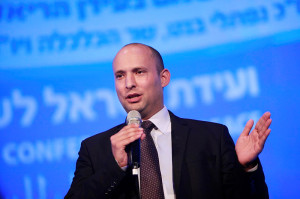
“I’m not worried about paying the price. I’m worried about getting the job done. We need a strong Israel.”
“Do you want to be a spectator or a player?”
These are the words used by Zeev Schwartz to explain his reason for entering politics. He hopes to make the Bayit Yehudi (Jewish Home) party list and run for a seat in the Knesset (Israeli parliament). The Bayit Yehudi primaries take place January 14.
Schwartz, 47, has been an educator throughout his adult life. A native of Johannesburg, South Africa, he was raised in a staunchly Zionist home. In fact, he was named after famous Zionist visionary Zeev Jabotinsky.
He also grew up in the religious-Zionist B’nei Akiva youth organization and later served as secretary-general of the world movement, which explains his choice of the dati leumi (religious-nationalist) Bayit Yehudi party.
The motto of B’nei Akiva is: Torah (Hebrew Scripture), Avodah (work) and Aliyah (immigration to Israel). It seems obvious that Schwartz has remained loyal to these ideals.

Naftali Bennett, Jewish Home party chair. (Photo: Flash90)
A Torah-observant Jew, he moved to Israel at the age of 17, studied for a year at the prestigious Yeshivat Har Etzion (school for advanced Talmudic studies in the Gush Etzion region of Judea and Samaria), served in the Givati combat brigade in the IDF as a lone soldier and obtained a Master’s degree in Political Science and Public Administration at Bar-Ilan University.
“I’m Israeli,” he asserts. “I’m here 30 years, married an Israel and speak Hebrew at home.”
Schwartz, a father of five, is founder and executive director of Torah MiTzion (in English, “Torah from Zion”), an international educational organization established 19 years ago with the goal of strengthening Jewish communities worldwide and, as the website explains, “infusing them with the love for Torah, the Jewish people and the State of Israel.” Over the years, the organization – through formal and informal education, with the participation of more than a thousand emissaries – has inspired Jewish pride and knowledge in countless Diaspora communities.
Leadership By Example
Schwartz maintains that the success of Torah MiTzion is largely due to leadership by example. “I’ve been preaching aliyah [immigration to the Jewish State] all these years, persuading people to come here.” he says, adding the Hebrew word Aharai, which means: “After me.”
His administrative and organizational skills, along with his friendly demeanor and idealism, have apparently contributed to the organization’s impressive growth. These are skills, he believes, that are needed for his new calling, which is “to be an address at the Knesset [Israeli parliament] for olim [immigrants], especially Westerners.”
“I understand the make-up of the Diaspora communities,” he adds. “I’ve been to practically every Diaspora community.”
‘You Need to Do what You Need to Do’
Although, for now, his aim is to make it to the Knesset, he sees himself as a good candidate for a position within the Diaspora Ministry and/or the Ministry of Immigration and Absorption.
A soft-spoken, sensitive individual, how he would deal with the cruel world of politics?
It’s rough going into politics, he concedes, “but you need to do what you need to do…. Like going to war, possibly paying the highest price.”
“I’m not worried about the price. I’m worried about getting the job done,” he states. “We need a strong Israel.”
One aspect of a strong Israel, he explains, is a Jewish State that can withstand extreme international pressure to give up land.
“That’s why you need a Bayit Yehudi party,” he asserts. “There’s no [peace] partner on the other side…. The only way to peace is to be strong.”
If Israel had a true partner in peace, would territorial concessions be an option?
“This is our land from God,” he declares. “Like [Bayit Yehudi chair Naftali] Bennett told CNN,” he would cite historical and archaeological facts.
According to Schwartz, however, a strong Israel means much more than holding on to the land.
Need for Greater Unity
It is imperative, he explains, to deal with the needs of society, such as education and welfare. “And Jews should be helping around the world, as Israel has in fact been doing,” he adds, noting the impressive global contributions made by the Jewish State, such as fighting the ebola epidemic and being the first to come to the aid of countries that experienced a natural disaster.
What concerns Schwartz greatly is the need for greater unity among the People of Israel.
“Probably the first thing I’d like to do in the Knesset is meet the other 119 MKs [Members of Knesset] and create understanding,” he says. “I’m not naïve, but at the end of the day, people have to learn to work together.”
By Atara Beck
Senior Editor, United with Israel
